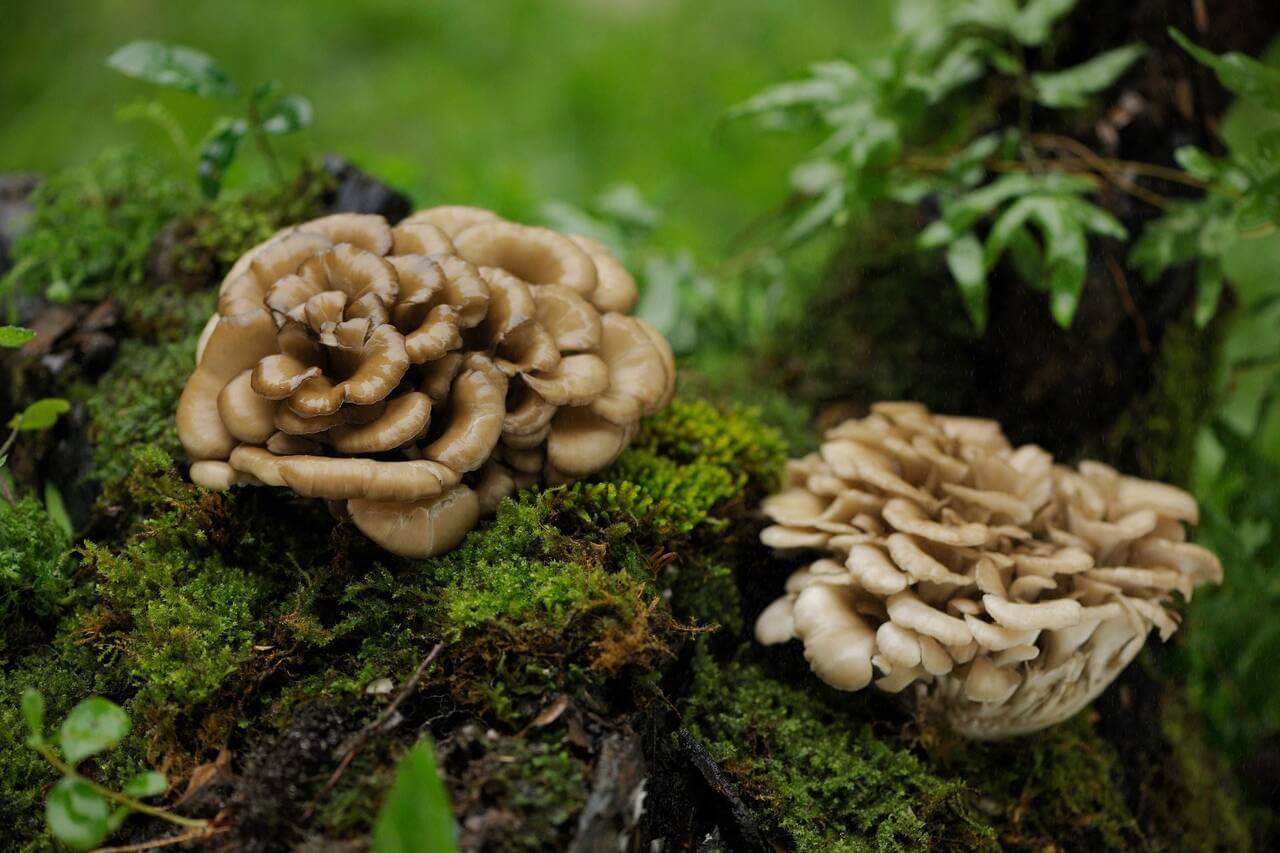Picture this: you’re foraging through a Japanese forest when you stumble across a cluster of frilly, cloud-like mushrooms growing at the base of an oak tree. You’d probably dance too if you knew what you’d just found.
That’s exactly what happened centuries ago. Japanese foragers literally danced when they discovered maitake mushrooms—hence the name “dancing mushroom.” They weren’t just celebrating a tasty dinner ingredient. They knew they’d found something special.
Fast-forward to today, and science is catching up to what these foragers understood instinctively. If you’ve been dealing with constant fatigue, catching every bug that goes around, or watching your energy crash after meals, maitake might offer the natural support you’ve been looking for.
What’s Actually Inside These Mushrooms?
Maitake (Grifola frondosa) grows wild under oak, elm, and maple trees across Japan, China, and North America. What makes it stand out isn’t just its distinctive ruffled appearance—it’s what’s packed inside.
The real star? Beta-glucans. Think of these as tiny biological switches that can flip your immune system from “meh” to “ready for action.”
Here’s what you get in each serving:
- Beta-glucans – The immune-boosting powerhouses
- B-vitamins – Your energy production crew
- Vitamin C – Classic immune support
- Potassium – Keeps your heart happy
- Copper – Helps your body actually use iron
- Antioxidants – The cellular cleanup crew
Plus, they’re completely fat-free, low in sodium, and won’t mess with your cholesterol levels. Not bad for something that grows on tree stumps.
What Maitake Actually Does for Your Body
Enough with the hype. Let’s talk real benefits backed by actual research.
Your Immune System Gets a Serious Upgrade
Your immune system is like your body’s security team. Sometimes it’s asleep on the job, sometimes it overreacts and causes chaos. Maitake helps it find that sweet spot.
Here’s what happens: Those beta-glucans I mentioned? They basically wake up your immune cells and give them a pep talk. Studies show maitake can boost both cellular and humoral immune responses—fancy science speak for “your body gets better at fighting off the bad stuff.”
People report feeling like they bounce back faster from minor illnesses and don’t catch everything that’s going around. Not magic, just your immune system working like it should.
Blood Sugar Stability (Finally)
Tired of that post-lunch energy crash? Maitake might help smooth out those blood sugar roller coasters. Research suggests it can improve how your cells respond to insulin, which means more steady energy throughout the day.
It’s not going to replace your diabetes medication (never do that without talking to your doctor), but it might help your body handle glucose more efficiently.
Heart Health Support
Your heart beats about 100,000 times a day. Might as well give it some support, right? Animal studies show maitake can help with cholesterol levels and blood pressure, though we need more human research to know for sure.
The liver support angle is interesting too—maitake seems to help your liver process fats more efficiently, which could benefit your overall cardiovascular health.
Cancer Research (Handle with Care)
This is where things get tricky. Yes, there’s research on maitake and cancer. Some studies show promise with tumor reduction using maitake D-fraction extract. But—and this is important—eating maitake mushrooms isn’t going to cure cancer.
The research is early, mostly done in labs or on animals. If you’re dealing with cancer, talk to your oncologist about complementary approaches, don’t go it alone with mushrooms.
Skin Benefits (The Unexpected Bonus)
Here’s something most articles skip: maitake might help your skin from the inside out. Recent research suggests it could help with conditions like eczema by reducing inflammation and supporting skin barrier function.
Those same beta-glucans that boost immunity also seem to help with skin hydration and healing. Not bad for a fungus.
Interactive: Find Your Ideal Maitake Dosage
Body Weight:
Health Goal:
How to Actually Use Maitake (The Practical Stuff)
Great, so maitake sounds promising. But how do you actually use it without screwing it up?
Fresh vs. Dried vs. Extract—What’s the Deal?
| Form | Good For | Strength | Your Wallet |
|---|---|---|---|
| Fresh mushrooms | Cooking, mild benefits | Gentle | Easy on budget |
| Dried powder | Smoothies, daily use | Moderate | Middle ground |
| Concentrated extract | Serious health goals | Potent | Investment |
Dosage That Actually Works
Most articles leave you hanging here. Not this one.
- Fresh mushrooms: 1-3 oz daily (think a small handful)
- Dried powder: 1-3 grams daily (about half a teaspoon)
- Extract capsules: 200-600mg daily (check the label for D-fraction content)
Start low, go slow. Your stomach will appreciate the gradual introduction.
Timing Matters
When you take maitake can affect how well it works:
- For immune support: Morning with breakfast
- For blood sugar: 30 minutes before your biggest meal
- For general wellness: Same time every day (consistency beats perfection)
Safety First: What You Need to Know
Let’s be real about this. While maitake is generally safe for most people, it’s not risk-free for everyone.
Who Should Be Careful
- Diabetics on medication: Maitake can lower blood sugar, which might cause problems with your meds
- People with autoimmune diseases: Immune stimulation isn’t always good if your immune system is already overactive
- Pregnant women: Not enough safety data, so better to skip it
- Surgery patients: Stop taking it 2 weeks before any procedure due to blood sugar effects
Possible Side Effects
Most people handle maitake just fine, but some might experience:
- Upset stomach (especially when starting out)
- Dizziness if blood sugar drops too much
- Allergic reactions (rare, but mushroom allergies exist)
If you’re new to maitake, start with small amounts and see how your body reacts.
Common Questions About Maitake
How long before I notice anything?
Most people start feeling differences in energy and immunity within 2-4 weeks of consistent use. Blood sugar effects might show up sooner. Don’t expect overnight miracles—this is about building long-term health.
Can I mix maitake with other supplements?
Usually yes, but watch out for interactions with diabetes medications or other immune boosters. When in doubt, space things out by a few hours or check with your doctor.
Is maitake better than other medicinal mushrooms?
It’s not about being “better”—different mushrooms do different things. Maitake rocks at immune and blood sugar support. Reishi is your go-to for stress and sleep. Lion’s mane helps with brain function. Pick based on what you need.
Should I take breaks from maitake?
The research doesn’t show you need to cycle on and off, but some people take a week off every couple months just to be safe. There’s no hard rule here.
What’s this D-fraction stuff I keep hearing about?
D-fraction is the concentrated, purified beta-glucan extract from maitake. It’s more potent and has more research behind it, but costs more too. Regular extract works fine for most people.
The Bottom Line
So here’s where we stand: maitake mushrooms have some solid science backing their traditional reputation. They’re not going to cure everything that ails you, but they might give your immune system and blood sugar management the boost they need.
The research is promising, especially for immune support and metabolic health. The safety profile is good for most people. And unlike a lot of trendy supplements, this one has centuries of traditional use backing it up.
If you’re dealing with frequent minor illnesses, blood sugar swings, or just want to support your overall health naturally, maitake is worth considering. Just keep your expectations realistic and give it time to work.
Start with a quality product, begin with smaller doses, and stick with it for at least a month before deciding if it’s helping. Your body doesn’t change overnight, but small, consistent steps can add up to real improvements over time.
This article is for educational purposes only and doesn’t replace medical advice. Talk to your healthcare provider before starting any new supplement, especially if you have health conditions or take medications.

